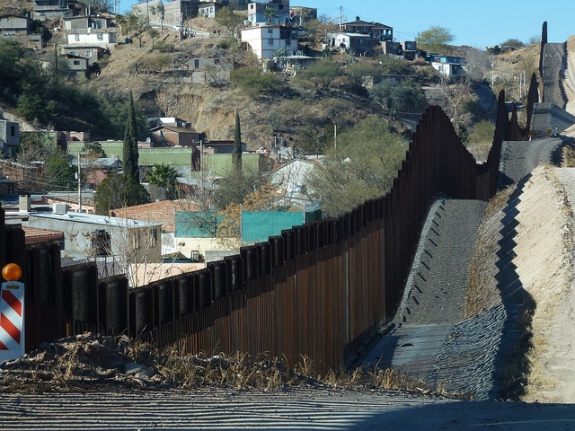Noticia
Human Rights Abuses Along U.S.-Mexico Border Underscore Need for Reform
Publicado el 5 de abril de 2012
por Walter Ewing en Immigration Impact, April 5, 2012
U.S. immigration and border-enforcement policies have precipitated a litany of human-rights abuses along the U.S.-Mexico border, from the needless deaths of border-crossers to inhumane conditions in immigration detention to the racial profiling of entire Latino and indigenous communities. That was the principal finding of the human rights groups which presented testimony at a recent hearing of the Inter-American Commission on Human Rights (IACHR). It was also the main conclusion of a recent report by Amnesty International. Both the hearing and the report underscore the urgent need for the U.S. government to abide by the human rights treaties to which it is a signatory.
Amnesty International’s report, entitled In Hostile Terrain: Human Rights Violations in Immigration Enforcement in the U.S. Southwest, details numerous human-rights abuses at the U.S.-Mexico border, including:
- The “prevention through deterrence” strategy of immigration enforcement, which seeks to re-direct the flow of unauthorized immigrants into ever-more isolated and dangerous terrain with the explicit aim of placing them in “mortal danger.” The result: 5,287 pointless deaths of border-crossers from 1998 through 2008.
- The conditions confronting immigrants in detention, such as physical abuse, inadequate food and medical care, lack of access to legal counsel, coerced signing of removal documents, and prolonged (sometimes permanent) separation from U.S.-citizen children.
- Anti-immigrant legislation passed by state legislatures in Arizona, Alabama, and elsewhere, which limit access to medical care and education for both immigrants and their U.S.-born children.
- The racial profiling of Latinos and indigenous peoples by federal, state, and local law-enforcement personnel who are searching for unauthorized immigrants. This is evident in the fact that brown-skinned people are “disproportionately targeted for stops and searches.”
To remedy these and other injustices, Amnesty International proposes 43 reforms of U.S. immigration and border-enforcement policies, including:
- The federal government should review and revise the “prevention through deterrence” policy to ensure that it is “compliant with the USA’s obligations under international law and standards, including with the right to life.”
- “All state governments should ensure that state legislation respects immigrants’ rights, including the rights to freedom from discrimination, to due process and the rights to health and education.” When states pass legislation which does not respect immigrants’ rights, the federal government should intervene.
- “All state, county and local police departments should implement policies that prevent officers from inquiring into the immigration status of individuals when people are reporting crime as victims or witnesses so that immigrants are not afraid of reporting victimizations.”
- The Department of Homeland Security “should ensure that every person who is at risk of removal from the USA is given access to a judicial hearing, interpretation services and to a review by a judicial authority in the event of a negative decision. All immigrants in detention while in removal proceedings should have access to legal representation in order to be able to challenge their detention.”
The human-rights organizations which presented testimony at the IACHR hearing made many of the same points as Amnesty International’s report. The hearing was a follow up to a September 2011 report by the group No More Deaths, entitled A Culture of Cruelty: Abuse and Impunity in Short-Term U.S. Border Patrol Custody. That report concluded that “the abuse, neglect, and dehumanization of migrants is part of the institutional culture of the Border Patrol, reinforced by an absence of meaningful accountability mechanisms.”
The basic point of Amnesty International’s report and the IACHR hearing is simple: even unauthorized immigrants have human rights, and the U.S. government is not respecting those rights despite its obligations under international law to do so.
Photo by a_isacson.
Clasificación
País
Estados Unidos
Temática general
[Derechos civiles][Frontera][Frontera]
Temática específica
[48][45][44]

Noticias recientes
Publicada el 1 de abril de 2022
Preguntas y respuestas: La frontera México-Estados Unidos después del Título 42
Publicada el 25 de marzo de 2022
New rules aim to decide US asylum cases in months, not years
Publicada el 3 de mayo de 2021
Capacitarán INM y Amepac a personal para atención de migrantes

